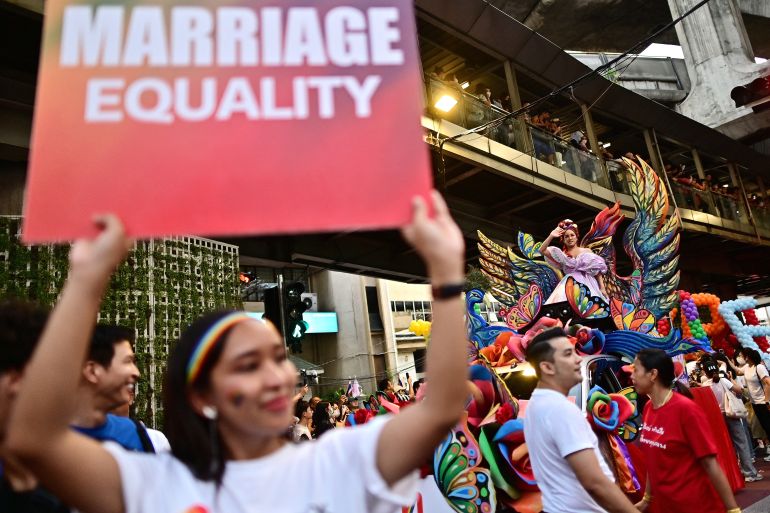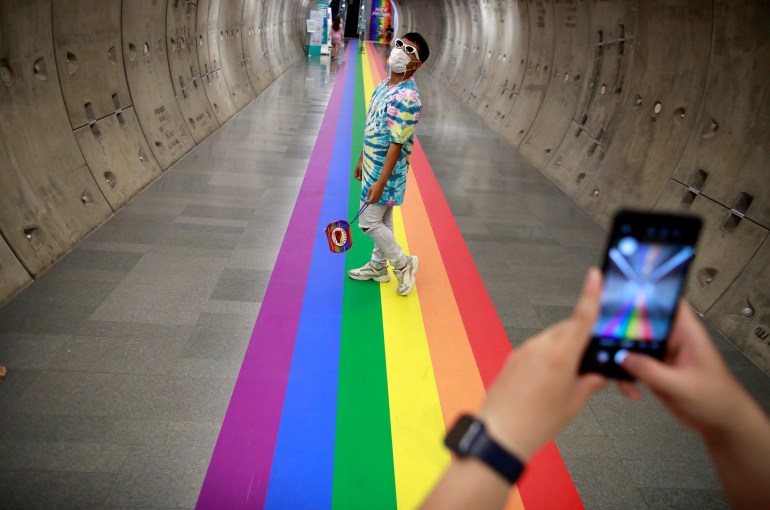LGBTQ advocates cheer Thailand’s latest drive for same-sex marriage law
If passed by parliament, Thailand would be first country in Southeast Asia to legalise same-sex marriage and only the second in Asia, after Taiwan.

Bangkok, Thailand – Somphat Satanavat has big plans for his wedding day.
He has started looking for just the right hotel for the banquet, something in a neoclassical or colonial style. He knows the type of traditional Thai music he wants played and pondered the guest list.
Keep reading
list of 4 itemsRussia seeks to outlaw LGBTQ movement as ‘extremist’
Uganda’s anti-LGBTQ law causing wave of rights abuses, activists say
India’s LGBTQ community battles same-sex marriage ‘heartbreak’ from court
But as a gay man in Thailand, where the law says that marriage must be between a man and a woman, it is still just a dream for him and his partner of 25 years.
For now, Somphat said, “I [am] planning just in my mind.”
That may soon change.
Last week the cabinet of the Thai government endorsed a bill that would amend the country’s Civil and Commercial Code to define marriage as between any two “individuals”.
If approved by Parliament, it would make Thailand the first country in Southeast Asia to legalise same-sex marriage and only the second in all of Asia, after Taiwan.
The government is hoping to move quickly and to hold the first of three votes the bill will need to pass to become law by next month.
“The prime minister [wants to] push [it] very much. He wants to see this bill appear in the Parliament debate as soon as possible,” government spokesperson Chai Watcharong told Al Jazeera.
If and when approved, “all legal rights after they marry will be 100 percent like man and woman,” he said.
“We consider that there is no reason to say no because people should have the right to decide their own way of living. Even though they are male and male, they love each other…so they should have the right,” he added.
Thailand has been here before
The previous two administrations each sponsored a same-sex union or marriage bill of their own. But they failed to make it out of the lower house before Parliament was dissolved to make way for national elections, setting the process back to square one each time.
LGBTQ rights advocates say this is the best chance Thailand has had yet to get the law passed.
Thailand’s current government is only months into a four-year mandate, which allows plenty of time to push the bill through barring a sudden coup or collapse. Major parties on both sides of the aisle are also in favour of the legislation.
Rapeepun Jommaroeng, an adviser and policy analyst for the Rainbow Sky Association of Thailand, which advocates for LGBTQ rights, expects pushback from some religious groups, mainly from the predominantly Buddhist country’s Christian and Muslim minorities. But, he says, they are unlikely to derail the bill.
“The country has been clear that we will not force any religious leaders or priests or monks to perform the [same-sex] marriage ceremony,” Rapeepun said.
“This law is not about forcing people to do things they don’t want to. This is purposefully broad to enable people to have equality,” he said.
“It’s just only to give the liberty and freedom for two people to be united.”

Rapeepun passage of the bill will also be eased by the fact that Thailand allows Islamic law to replace some national laws – except those dealing with defence or security – for Muslims who live in the southernmost provinces, where they are in the majority. That should make the Civil and Commercial Code, and any amendments, inapplicable to southern Muslims.
Chai, the government spokesperson, confirmed to Al Jazeera that the code does not apply to Muslims in those provinces.
For the rest of the country, the LGBTQ community say the bill portends a new dawn for Thailand, one that promises to bring them a greater sense of respect, equality and freedom to be themselves.
If passed, “it means that the country has progressed to another level of civil liberty or civil freedom to recognize the diversity in Thai society,” Rapeepun said.
“This is a time that they can celebrate and they can be themselves and they don’t need to lie any more.”
It can literally mean the difference between life and death, says Tunyawat Kamolwongwat, who was among the first four openly LGBTQ lawmakers elected to Thailand’s Parliament in 2019.
Re-elected this past May, he recalled a trip to the north of the country last year, when a young woman approached him to share the story of a close friend, who was gay, driven to suicide by his family’s rejection.
“He decided to kill himself because his family [did] not accept his life[style]. She told me that story and I [was] crying, and I think it will [soon] change so people can come out,” Tunyawat said.
Tunyawat said recognition of same-sex marriage would give LGBTQ people a voice they had long been denied.
“We can stand up and talk to the one who bullies us that I’m a human because we all have equal rights.”

The law would also allow same-sex couples to adopt children and open up a raft of other opportunities reserved for those who are married.
“It’s not only marriage status, to announce that they are a couple by law. But another thing is it’s related to social welfare and social services and other benefits combined with the law,” said Kath Khangpiboon, a trans woman and advocate who teaches gender studies at Thailand’s Thammasat University.
The benefits include tax deductions and the right for spouses to give each other medical consent, co-manage property and pass on wealth.
Such issues have weighed heavy on the mind of Somphat, who owns a confectionary company and worries about being able to pass on his stake in the operation to his life and business partner if he should die, or about his partner being denied to right to make medical decisions for him should he ever slip into a coma.
For LGBTQ employees of the government, marriage would also give them newfound access to a suite of public health benefits.
Most Thais seem ready
Somphat recalled a friend, a trans woman, who teaches at a government school whose partner needed thousands of dollars to pay for medical care to treat a life-threatening illness.
Because they could not get married, Somphat recounted, the woman could not add her partner to her health plan and they could not afford the treatment, and he died.
“I don’t want just to exchange the rings, have a beautiful day with flowers, with friends,” Somphat said. “We need … our country’s law [to] accept what I am,” he said.
Should Parliament pass the bill, advocates say the law can finally start catching up with Thailand’s image as a country that accepts, even embraces the LGBTQ community.
A 2022 survey by the government’s National Institute of Development Administration found that nearly 80 percent of those polled supported legalizing same-sex marriage.
Advocates blame the lack of progress to date on such a law on the outsize influence of conservative political donors or on the military, which aligns itself with the country’s deeply conservative monarchy and wields significant political power itself, whether directly or via proxy parties.
Rapeepun also ascribed the delay to pressure from some of Thailand’s neighbours.
In Southeast Asia, Brunei and Malaysia, both Muslim-majority countries, and Myanmar all outlaw gay or lesbian sex. He hopes Thailand will soon become a “beacon” of hope for those pining for change elsewhere, or at least a haven for those seeking respite from persecution for their sexual orientation.
Somphat is eager for the day that happens.
“The first day, if possible, I will go to the government office and sign up to get married,” he said.
Then, he added, “I can tell anyone, by the law he’s my husband… I think it will be a very happy time.”